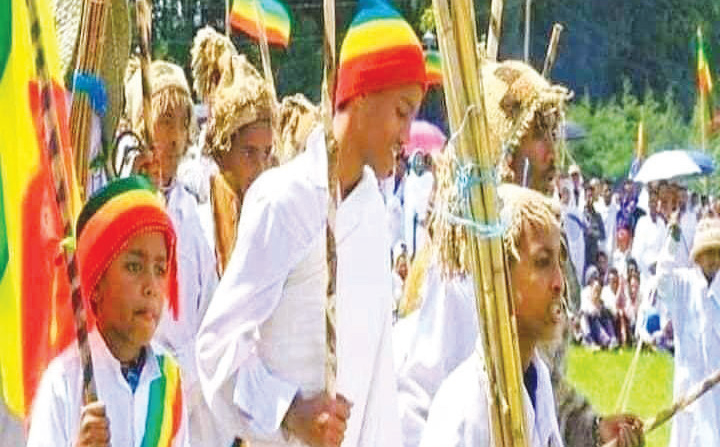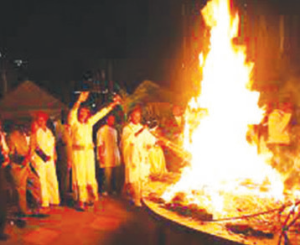
Ethiopia has diversified cultural and religious festivals that gain special attention among international and local tourists. Being home to more than 80 nations, nationalities, and peoples, the country embraces immense potential to attract more tourists through effectively utilizing its cultural and natural endowments.
Currently, the government also gives due priority to the tourism sector, and; it is investing hugely in developing the sector.
Buhe, which marks the Transfiguration of Jesus on Mount Tabor and is celebrated warmly every year among followers of the Orthodox Church, is the one. The feast, which has both religious and cultural importance, is celebrated every year, during the high rainfall season. This festival is gaining momentum year after year following the due attention given by society to further promote the culture. Following this, children in the urban and rural parts of the country annually gather to mark the day with different ceremonial occasions.
The group song among boys becomes the colorful part of the cultural part of the festival where boys collect money to celebrate the day with their peers. Hoya Hoye’s song is usually performed by a group of boys.
The boys wait for the annual Buhe festival eagerly. They prepare their own plan before the actual day of the celebration. They start fulfilling the basic preconditions to make their group’s Buhe song better than others. Torches, Mulmul (bread), Jiraf (bigger whip), and decorated sticks, among others, are needed to celebrate Buhe colorfully.
Buhe is annually celebrated on August 19 in the urban and rural areas of Ethiopia. The festival is commonly known as children’s holiday where children are allowed to go out and discover their surroundings. As the festival is celebrated annually during the school-off period, children utilize this opportunity to be well-prepared.
Before and on the actual Buhe day, children [always boys] will sing the common Buhe songs and their own poems, on the streets of Addis Ababa and move from doorsteps to doorsteps. In turn, they receive Mulmul (bread) or money.
The Buhe boys sing songs of admiration, best wishes of success, and peace for any individual on their way. Presenting outstanding poems, performing attractively, and having the best sound of Jiraf, among others enable the children to be well admired by the community and gather more rewards.
Then, the children will utilize the gathered Mulmul bread and money together to celebrate the Buhe festival wonderfully. They will also share the remaining money equally.
Having Jiraf is one of the outstanding manifestations of Buhe festival. Children will compete with the roaring sounds and decorations of their Jiraf. Experts from the Ethiopian Orthodox Tewhido Church (EOTC) express that the sounds of Jiraf during the Buhe season represent the sound of Jesus Christ from the sky. The cultural aspect of the Jiraf sound on the other hand represents the coming of a New Year. Therefore, it heralds a new hope and motivates people to be ready for the New Year.
Regarding conserving the Buhe festival for future generations, the active participation of every stakeholder is important.
Moreover, preparations are underway to register the Buhe cultural celebration as the country’s national intangible heritage, experts said.
In an interview with The Ethiopian Herald, Addis Ababa City Administration Culture Tourism Bureau Senior Heritage Expert Memhir Mekibib Gebremariam said that various studies have been conducted on the preconditions that enable Buhe’s cultural celebration registration as a national heritage.
Accordingly, the Authority for Research and Conservation of the Cultural Heritage (ARCCH) has done successive research works in various parts of the country where the holiday is marked colorfully.

The Buhe celebration is more known in Menz, Gondar, Wollo, South Gondar (Debre Tabor), and Addis Ababa, he said.
As to him, the registration of this cultural celebration as a national heritage will have a significant socio-economic benefit.
In addition, registration and conservation of the country’s diversified intangible cultural heritages is important to promote the country’s tourism sector through building the national image among the international community, he noted.
Moreover, the City Administration Culture and Tourism Bureau in collaboration with pertinent stakeholders facilitate the platform to celebrate the day through keeping the original cultural ceremonial process annually.
“Currently, the new generation is playing an important role in preserving and celebrating such cultural holidays through inheriting and keeping our forefather’s/foremother’s cultural wisdom and arts. It is the right time to utilize the immense potentials of cultural heritages through promoting via the social and mainstream media,” he said.
Accordingly, the government has given due priority to developing the tourism sector and generating a tangible income.
In this respect, the Buhe festival could be a tangible source of income if developed and utilized properly for tourism. Buhe festival is among the leading festivals that have great potential to showcase ancient Ethiopia’s cultural manifestations.
The festival has enormous spiritual, cultural, social, and economic values. Buhe has both spiritual and cultural aspects. The festival creates a sense of ownership among the new generation and contributes their part in the efforts to conserve intangible heritages that are inherited from the ancestors through oral traditions.
The registration of this cultural celebration as a national heritage will have a significant socio-economic role. In addition, registration and conservation of the country’s diversified intangible cultural heritage is important to promote the country’s tourism sector through building the national image among the international community.
In Ethiopia, Buhe is believed to be the turning point from the high rainfall season to bright sunshine and a lovely month, September which is the first month of the Ethiopian New Year. There is a widespread belief that there will be no more heavy rain, floods, and landslides after Buhe is celebrated
BY TEWODROS KASSA
THE ETHIOPIAN HERALD FRIDAY 16 AUGUST 2024





